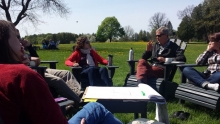You are here
Improving Approaches for Scientists and Stakeholders to Co-design Environmental Scenarios

Planning for the future involves overcoming uncertainty to anticipate the unknown. An increasingly popular approach for developing future plans while managing uncertainty is scenario development, whereby several consistent and coherent storylines are developed to reflect different hypotheses about how the future might unfold. In a new paper published online in the journal Ecology and Society by Marissa McBride of Harvard Forest and Imperial College London, in collaboration with Harvard Forest scientists Kathy Fallon Lambert and Jonathan Thompson, the team offers a tested approach for increasing the effectiveness of scenario development for environmental decision-making by facilitating the active contributions of stakeholders and scientists in the scenario design process.
Using the Harvard Forest-based New England Landscape Futures project as a case study, the authors explored how to balance the needs of stakeholders and scientists during the process of developing future scenarios. They found that by focusing on three priorities: maximizing stakeholder involvement in the scenario development process, efficient use of stakeholder time, and research needs, they were able to develop a robust protocol for engaging stakeholders in the full scenario development process via an intensive, structured, one-day workshop. The resulting narrative scenarios and quantitative inputs that are the outcomes of the intensive workshops are able to parameterize land-use simulations, which can in turn inform environmental decision-making. The authors tested their approach in six state-specific workshops and successfully elicited divergent scenarios that stakeholders perceived as being plausible and relevant. The authors provide additional details about how to manage expectations, balance stakeholder needs and research needs, and how to overcome challenges inherent in the scenario development process. They conclude that engaging stakeholders in the design process can improve the effectiveness of the ecological scenario development process.
- Read the article: Increasing the Effectivelness of participatory scenario development through codesign.
- Learn more about related work
- Learn more about the initiative coordinating this project: the Science Policy Exchange

